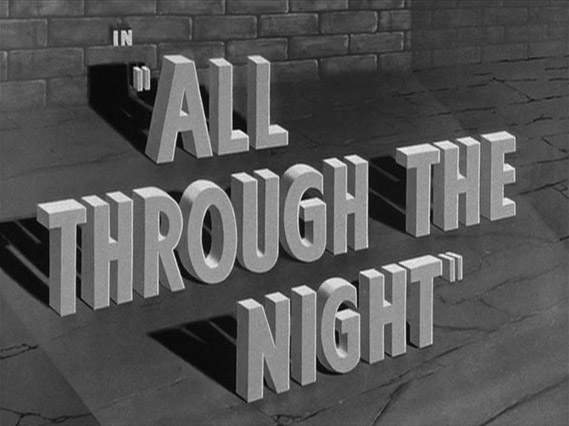Designers and typography nuts, take note. There are two terrific and terrifically illustrated pieces out there that you simply must see. Dave Addey‘s launched Typeset in the Future, a blog about typography in science fiction, with a detailed breakdown of Kubrick‘s use of fonts in 2001: A Space Odyssey (1968). And then there’s Art of the Title‘s marvelous overview, complete with clips, “They Came From Within: B-Movie Title Design of the 1940s & 1950s.” A piece on the 1960s will follow, too.
Molly Lambert‘s survey of “Downtown Los Angeles in Film” at Grantland is being hailed by many as a sort of companion to Thom Andersen’s Los Angeles Plays Itself—an updated one, as she comments extensively on Spike Jonze’s Her, whose “subtle dystopia just freaks me out more than an obvious Mad Max dystopia because it’s so plausible. It’s creepy and soulless and spirit-killing the same way that an Apple Store is. Perhaps that’s the point.”
“If American Hustle’s tragedy is a mediated reflection of the defeat of popular social forces that once hoped to contain capitalism, The Wolf of Wall Street, which is set about a decade later, is a testament to the effects of that defeat.” Tim Barker elaborates in the New Inquiry.
“If one were to create a stylistic spectrum of great writers in the twentieth century, Harold Pinter and Marcel Proust would likely wind up on opposite ends of it,” writes Elisabeth Zerofsky for the New Yorker. “So, when choosing a writer to adapt In Search of Lost Time for the screen, one would not be inclined to think first of Pinter—and yet, that is what happened. In 1972, a previous collaborator of Pinter’s asked if he’d be interested in working on a screenplay of Proust’s massive work, and Pinter, having read only Swann’s Way, accepted.” The film was never made but actor and director Di Trevis did stage a public reading of The Proust Screenplay.
The New Yorker‘s Richard Brody on watching and writing about movies
Teller’s Tim’s Vermeer “was the most intellectual fun I’ve had at the movies in the last year,” writes David Bordwell. After enthusiastically recommending it, he gets into it.
For the Playlist, Jessica Kiang talks with Terry Gilliam, who’s still planning to start shooting The Man Who Killed Don Quixote on October 3. He’s also got a small role in the Wachowskis’ Jupiter Ascending.
Ioncinema is counting down its “Top 200 Most Anticipated Films of 2014.”
It’s Alain Resnais Day at DC’s.
IN OTHER NEWS
“The only known novella by film star Charlie Chaplin has been published, 66 years after it was written,” reports the BBC. “Footlights, the basis for his 1952 film Limelight, has been reconstructed by Chaplin’s biographer, David Robinson.”
True/False Film Fest‘s Paul Sturtz and David Wilson have “announced the launch of their organization’s innovative (and highly laudable) ‘Pay the Artists!’ program,” reports Filmmaker‘s Nick Dawson. “The heads of the 10-year-old Columbia, MO-based festival (which runs February 27 – March 2), initiated the patronage program as a way of helping to sustain the documentary film ecosystem, and this year will be offering $450 to the filmmaking teams who attend the festival.”
“A Handy Tip For the Easily Distracted” by Miranda July from NOWNESS.
OBIT
“Actor Christopher Jones has died at the age of 72,” reports Phil Dyess-Nugent at the AV Club. “In his ’60s heyday, Jones was sometimes compared to James Dean, and though he lived a lot longer, his Hollywood career was almost as brief.” Joe Leydon: “After attracting attention in The Legend of Jesse James, a 1965-66 TV Western, the Tennessee-born Jones graduated to motion pictures with starring roles in Chubasco (1967), opposite Susan Strasberg (to whom he was married briefly); Three in the Attic (1968), a wink-wink, nudge-nudge comedy in which he played a faithless stud who’s captured and, ahem, erotically exploited by three vengeful lovers; and The Looking Glass War (1969), a John le Carre-inspired spy thriller best remembered (by those who remember it at all) as an early showcase for supporting player Anthony Hopkins.”
ENDNOTE
Listening (69’53”). In the latest episode of The Cinephiliacs, Peter Labuza talks with Columbia professor and former programmer of the Film Society of Lincoln Center and the New York Film Festival, Richard Peña.
For news and tips throughout the day every day, follow @KeyframeDaily on Twitter and/or the RSS feed. Get Keyframe Daily in your inbox by signing in at fandor.com/daily.




